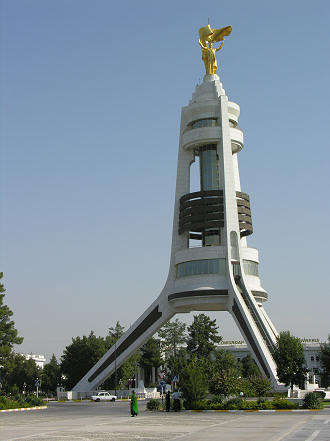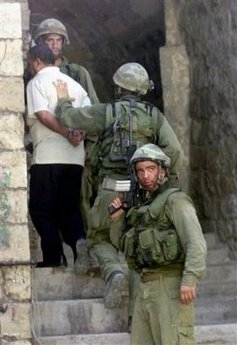Interim report of the secretary-general on the UN Interim Force in Lebanon, April 30, 2001:
"Since the resolution was adopted [i.e., since Israel's withdrawal], the situation has remained essentially unchanged, although there were further developments in the dispute over Shab'a farms area. As before, there were frequent minor ground violations of the Blue Line. There were, in addition, almost daily violations of the line by Israeli aircraft which penetrated deeply into Lebanese airspace. I have been in touch with the parties concerned and other interested parties to urge respect for the Blue Line and to avert further escalation."
Report of the secretary-general for the period from July 18, 2000, to Jan. 18, 2001:
"Israeli violations of Lebanese air space, which had resumed after Hizbollah's attack on 7th October, continued on an almost daily basis."
For the period from Jan. 23, 2001, to July 20, 2001:
"As reported in April, Israeli aircraft violated the line on an almost daily basis, penetrating deep into Lebanese airspace. These incursions, particularly those at low level breaking the sound barrier over populated areas, were especially provocative and caused great anxiety to the civilian population. The air violations are ongoing, despite repeated démarches to the Israeli authorities."
For the period from July 21, 2001, to Jan. 16, 2002:
"Israeli air violations of the Blue Line, however, continued on an almost daily basis, penetrating deep into Lebanese airspace. These incursions are not justified and cause great concerns to the civilian population, particularly low-altitude flights that break the sound barrier over populated areas. The air violations are ongoing, although démarches to the Israeli authorities […] have been made repeatedly by me, other senior United Nations officials and a number of interested Governments."
For the period from Jan. 17, 2002, to July 12, 2002:
"Unjustified Israeli air incursions into sovereign Lebanese airspace continued on an almost daily basis throughout most of the reporting period, often penetrating deep into Lebanon and frequently generating sonic booms. In the latter half of April, a pattern emerged whereby the aircraft would fly out to sea and enter Lebanese airspace north of the UNIFIL area of operation, thus avoiding direct observation and verification by UNIFIL. In January Hezbollah began responding to the overflights with anti-aircraft fire. This activity has continued through the present. On a number of occasions […] shells crossed the Blue Line. Calls on Israel to cease the overflights […]"
For the period from July 13, 2002, to Jan. 14, 2003:
"There were sporadic Israeli violations of Lebanese airspace, with periodic lulls in such activity punctuated by abrupt increases over periods of several days. On two occasions in November, Israeli overflights exceeded any recorded number since Israel's withdrawal from southern Lebanon in May 2000. Many of these air violations penetrated deep into Lebanon, often generating sonic booms over populated areas. The pattern identified in my last report continued, whereby the aircraft would fly out to sea and enter Lebanese airspace north of the UNIFIL area of operation, thus avoiding direct observation and verification by UNIFIL."
For the period from Jan. 15, 2003, to July 23, 2003:
"The most significant sources of tension were the persistent Israeli violations of Lebanese airspace and instances of Hezbollah antiaircraft fire directed across the Blue Line towards Israeli villages. […] Israeli air incursions into Lebanon increased overall during the reporting period, though the numbers have declined since early July. UNIFIL recorded almost daily violations across the Blue Line in some weeks. As in the past, Israeli overflights penetrated deep into Lebanon, often generating sonic booms over populated areas."
For the period from July 24, 2003, to Jan. 19, 2004:
"The recurrent Israeli air incursions into Lebanon continued. The numbers abated at times but periods of little or no activity were invariably followed by an intensification of the flights. […] Hezbollah continued to react […]"
For the period from Jan. 21, 2004, to July 21, 2004:
"A cycle of disruptions and armed exchanges across the Blue Line commenced on 5 May. Israel carried out more than 20 air sorties over Lebanon, a number of which generated sonic booms. Hezbollah subsequently fired several antiaircraft rounds […]"
"Israeli air incursions were on the whole less frequent than in the previous period, although they were notable for their intensity and the large number of aircraft involved. Israeli officials maintained that there would be overflights whenever Israel deemed them necessary. As in the past, Israeli aircraft often penetrated deep […] sonic booms over populated areas […] fly out to the sea […] avoiding direct observation […]"
For the period from July 21, 2004, to Jan. 20, 2005:
"Israeli air incursions into Lebanon continued throughout the reporting period. […] Israeli officials maintained the position that there would be overflights whenever they deemed them necessary. […] As in the past […]"
For the period from Jan. 21, 2005, to July 20, 2005:
"Violations of the Blue Line continued throughout the past six months, most often in the form of recurring air violations by Israeli jets, helicopters and drones as well as ground violations, from the Lebanese side, primarily by Lebanese shepherds. […] The Israeli Air Force continued their air incursion […] deep into Lebanon […] sonic booms […] whenever Israel deemed […]"
For the period from July 22, 2005, to Jan. 20, 2006:
"The Israeli Air Force violated Lebanese airspace on many occasions during the reporting period, disturbing the relative calm along the Blue Line. […] [I]n November, overflights by jets, helicopters and unmanned aerial vehicles or drones were numerous and particularly intrusive and provocative. […] There were no instances of Hezbollah antiaircraft fire across the Blue Line […]."
For the period from Jan. 21, 2006, to July 18, 2006:
"Persistent and provocative Israeli air incursions […] remained a matter of serious concern. […] A reduction in the number of air incursions in April contributed to an atmosphere of relative calm along the Blue Line, but this trend was reversed in May."
Antiwar.com














